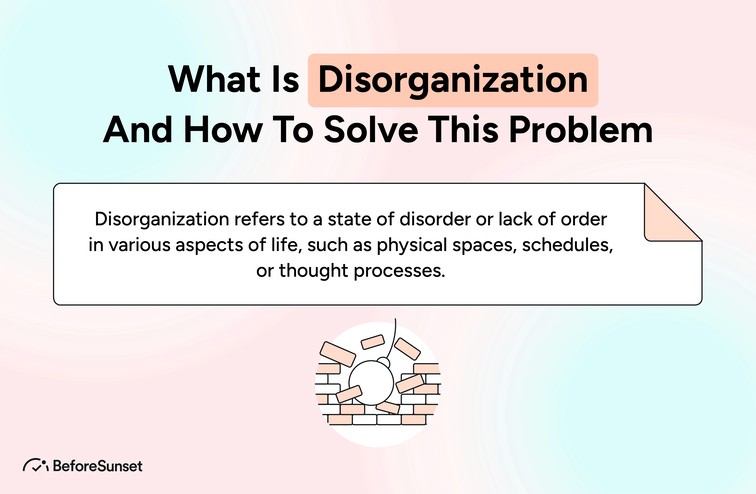Numerous people experience the effects of disorganization in both their personal and professional life. It shows up in a variety of ways, such as unkempt surroundings, unorganized schedules, and disordered thoughts and behaviors.
Disorganization has a wide range of negative effects, including stress, lower productivity, and a persistent sense of overload. The good news is that disorganization is an issue that can be solved with the appropriate approaches and outlook.

Impacts of Disorganization
Disorganization may have a wide variety of detrimental effects on a person's life in many different areas. Disorganization frequently has negative effects, some of which include:
Reduced Productivity: Being disorganized frequently results in inefficiency and time waste. It might take longer to perform activities when they are poorly planned or organized, which can reduce productivity.
Missed Deadlines: People are more prone to miss crucial deadlines for work, school, or personal obligations when they lack good organization and time management.
Stress Levels Rise: Living or working in an unorganized environment might cause stress levels to rise. It can be emotionally exhausting to constantly look for lost belongings or to feel the strain of impending deadlines.
Reduced Work Quality: Disorganization can lead to hurried or haphazard work, which lowers the output quality of tasks and projects.
Strained Relationships: Disorganization can strain relationships because missed deadlines or obligations can cause resentment or disappointment among friends, family, and coworkers.
Financial Consequences: Poor financial management can result in lost chances for savings, late bill payments, or even fines, which put a burden on your finances.
Health Issues: Chronic disorganization can lead to health issues such as sleep disorders, anxiety, and physical diseases since it raises stress levels.
Reduced Self-Esteem: Being disorganized can make someone feel inept or ineffective, which can lower their sense of self-worth.
Overwhelm and Burnout: Disorganization can cause a persistent sense of being overwhelmed by obligations, commitments, and duties, which in turn can lead to burnout.
Types of Disorganization
The difficulty of disorganization permeates all aspects of our lives and can interfere with our productivity, mental health, and general well-being. Even while the term "disorganization" refers to a general condition of anarchy and disorder, it manifests itself differently in several spheres of our everyday lives.
To successfully handle these issues, it is essential to understand the different forms of disorganization. Every sort of disorganization has its own specific set of challenges and effects, from the crowded places in our houses to the disorganized time management in our schedules, from disordered brain processes to digital information overload.
Chronic Disorganization
Chronic disorganization is a serious disorder that lasts for a long time and is defined by an ongoing failure to keep things organized and structured in several facets of life. It affects a person's everyday life on a long-term basis, going beyond the occasional chaos.
Due to their constant troubles, those who are afflicted frequently battle with excessive clutter, procrastination, and time management issues. They may also suffer from chronic tension and worry.
Chronic disorganization can seriously hinder one's personal and professional life, and treating it typically requires a long-term, multifaceted strategy that may include therapeutic interventions and professional assistance to create enduring strategies for better organization and overall wellbeing.

Situational Disorganization
Contrary to chronic disorganization, situational disorganization is a transient and situation-specific state of disorder that results from certain life experiences or situations. It happens when people go through major transitions, changes, or stressful circumstances, such as getting a new job, establishing a new house, or going through a family crisis.
People may find it difficult to maintain their typical levels of order and organization during these times. Situational disorganization can cause disturbances in everyday life, leading to clutter, missed appointments, and increased stress, even though it is frequently transient and associated with certain stresses.
Situational disorganization often decreases when the underlying issue is remedied or acclimated to, and people resume their regular levels of structure and order.
Attention Deficit Hyperactivity Disorder (ADHD)
The neurodevelopmental illness known as ADHD, or attention deficit hyperactivity disorder, typically affects children but can also last into adolescence and adulthood. It is characterized by recurrent patterns of impulsivity, hyperactivity, and inattention that seriously hinder everyday functioning.
People with ADHD could have trouble organizing their activities, paying attention for long stretches of time, and following through on assignments. While impulsivity results in rash decisions and problems postponing satisfaction, hyperactivity frequently takes the form of excessive fidgeting or restlessness.
Although the precise etiology of ADHD is unknown, it is thought to be a result of a confluence of genetic, neurological, and environmental factors. Behavioral therapy, medication, and educational assistance are frequently used in the treatment of ADHD to help people manage their symptoms and enhance their quality of life.

Compulsive Disorder (OCD)
A mental health disease known as obsessive-compulsive disorder (OCD) is characterized by severe and ongoing obsessions and compulsions. Anxiety-inducing invasive, unwelcome, and upsetting desires, thoughts, or visions are called obsessions.
Compulsions are repeating actions or thoughts carried out in reaction to obsessions in an effort to lessen the suffering they cause. Even when they are excessive or not realistically related to the dreaded occurrence, people with OCD frequently engage in these compulsions to avoid a feared event or to reduce the anxiety associated with the obsessions.
OCD can seriously interfere with everyday living and has to be treated with psychotherapy, medication, or a combination of the two in order to assist in controlling symptoms and enhance quality of life.
Professional Organizers and Strategies for Dealing with Disorganization
Many of us struggle with the ongoing problem of disorganization in a society where the demands of everyday life appear to be always growing. Disarray can creep into many areas of our lives, from messy environments to overflowing schedules, causing stress, decreased productivity, and a sense of disorder. Professional organizers can help by restoring peace and order in this situation.
Benefits of Professional Organizers
To help people and organizations overcome disorganization and enhance their quality of life, professional organizers may provide a variety of advantages. The following are some of the main benefits of hiring expert organizers:
Efficiency and Productivity: Professional organizers assist people in streamlining their settings, procedures, and time management. As a result, efficiency and productivity rise since jobs are better structured and simpler to perform.
Stress Reduction: Reduced stress and anxiety are benefits of well-organized rooms and routines. A sensation of peace and control may be achieved through routines and a clutter-free environment.
Time Savings: Professional organizers may help customers save time that can be used for more important or beneficial activities by streamlining daily routines and removing the need to look for missing goods.
Improved Health and Well-Being: An ordered home or workplace can promote improved physical and mental health. Stress levels can be decreased and general wellbeing can be enhanced by less clutter and better time management.
Enhanced Focus and Concentration: Organized workplaces and schedules promote enhanced attention and concentration, which leads to better decision-making and higher-quality work production.
Maximized Space Utilization: Whether it's in a house, workplace, or storage area, professional organizers may assist customers in making the most of their existing space to create a more practical and aesthetically pleasant environment.
Financial Savings: People who are more organized may be able to avoid financial hazards like duplicate purchases, late fees, and others that might arise from being disorganized.
Sustainability: By promoting recycling, trash reduction, and responsible consumption, clutter reduction and resource optimization can help people adopt more sustainable lifestyles.
Improved Personal and Professional Growth: By enabling people to concentrate on their objectives, aspirations, and self-improvement, a better organization can result in increased personal and professional development.
Customized Solutions: To ensure that the solutions offered are both efficient and long-lasting, professional organizers mold their tactics to the particular requirements and preferences of their clients.

Different Approaches to Organization Strategies
People can find individualized methods to effectively overcome disorganization by using various organizational tactics. While some people find success in time management strategies that help them organize their calendars and duties more effectively, others find benefit from a minimalist approach that focuses on clearing clutter and simplifying their lives.
Setting objectives and goals that are clear will also help people stay focused on what matters most. To overcome mental obstacles to organization, people can use cognitive-behavioral therapies to address the thinking processes and emotional components of disorganization.
Professional and collaborative organizing services provide individualized direction in organizing and decluttering rooms. Individual preferences, requirements, and the particular areas of life where disorganization is most bothersome ultimately determine the organization approach to choose.
Tips for Self-Help Efforts in Dealing with Disorganization
When you're dedicated to taking back control of your life, self-help strategies for coping with disorganization may be quite successful. Set attainable goals from the outset and divide them into smaller, more doable tasks. Set these jobs in order of importance and due dates.
Create organizational methods that are effective for you and establish regular routines. Reducing physical and digital clutter requires regular decluttering and keeping only what you need. Utilize time management tools like calendars and to-do lists to increase your efficiency. Hold yourself accountable and continue to follow these routines.
Look for ideas and guidance through books, movies, or podcasts about organizing and personal growth. Keep in mind that self-improvement is a journey and that obtaining and maintaining a more orderly and stress-free existence requires patience and determination.
Want To Be More Organized? Try BeforeSunset AI
BeforeSunset AI is a productivity and organization tool that can help you streamline your work and personal life by centralizing tasks and schedules. It allows you to plan, prioritize, and track tasks which will make you more organized than ever.


